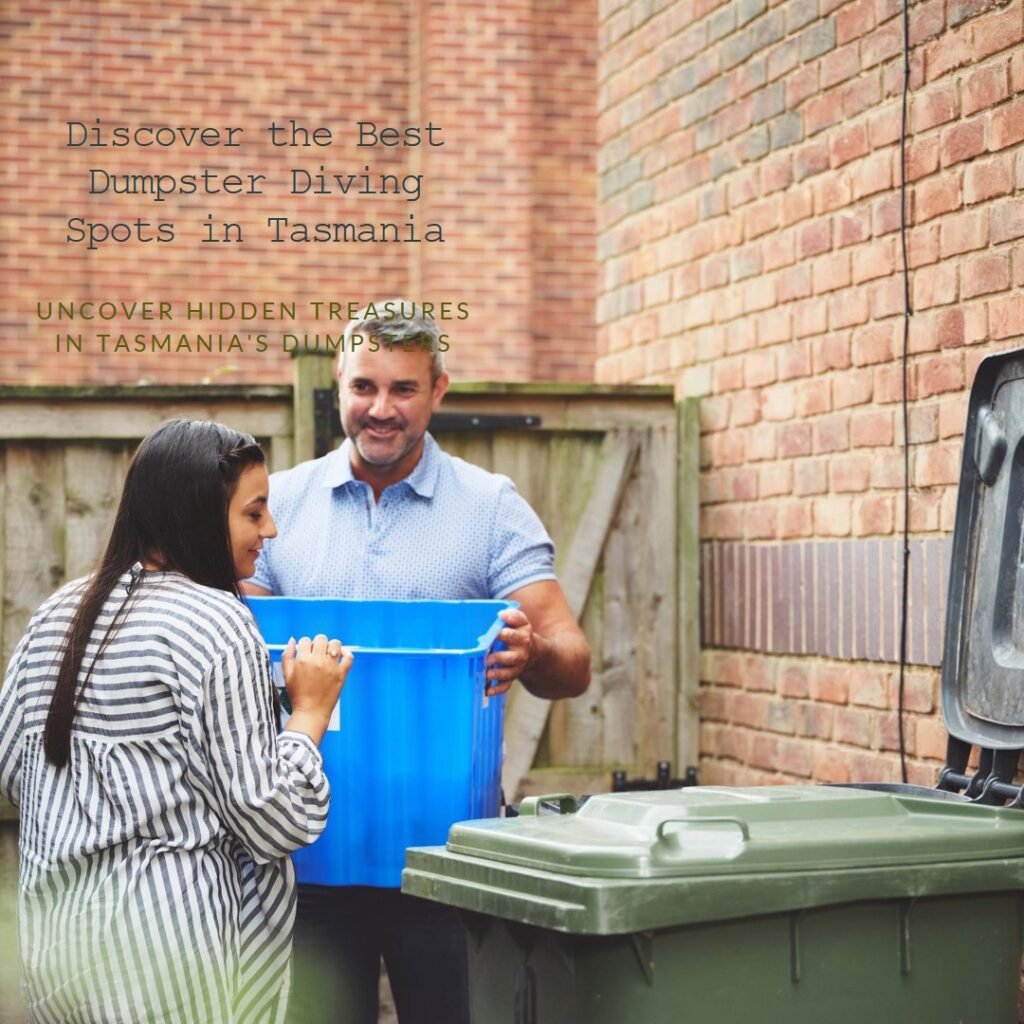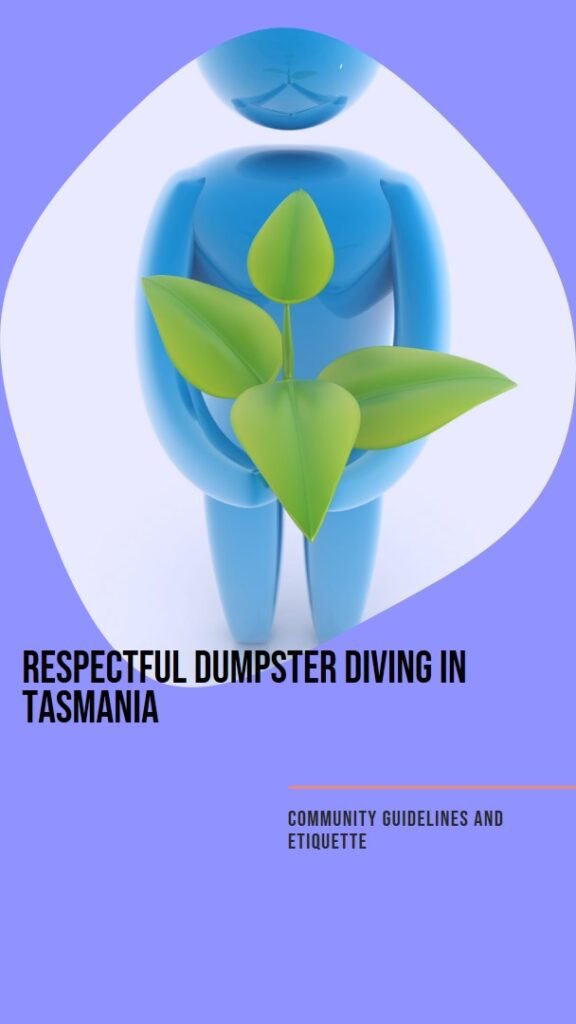Hey there! So, you’ve decided to learn more about dumpster diving in Tasmania. It’s really an interesting and sustainable way to find useful items that would otherwise go to waste. By exploring various dumpsters, you can stumble upon some real treasures like perfectly good fruits and vegetables, books, furniture, or even electronic devices. It’s not just about finding free stuff; it’s also a way to reduce waste and promote recycling.
Ethical considerations in dumpster diving
When engaging in dumpster diving, it’s essential to keep a few ethical considerations in mind. Always make sure to respect private property and avoid trespassing. Additionally, remember not to leave a mess behind and clean up after yourself. It’s also crucial to only take what you need and leave the rest for others. By following these ethical guidelines, you can enjoy the benefits of dumpster diving while being mindful of the environment and others’ rights.
Is Dumpster Diving Illegal in Tasmania?
No, dumpster diving is not explicitly illegal in Tasmania. However, it’s essential to be mindful of trespassing on private property when searching through dumpsters. Always seek permission or ensure you are diving in areas where it is allowed, such as public spaces or designated areas for discarding items.
Is Dumpster Diving Illegal at Nighttime in Tasmania?
There are no specific laws prohibiting dumpster diving at nighttime in Tasmania. However, it’s crucial to adhere to local council regulations and respect noise ordinances that might be in place during late hours. Being considerate of the community while engaging in nighttime dumpster diving can help maintain a positive relationship with the neighborhood.
By being aware of these legal considerations and conducting dumpster diving responsibly, you can enjoy the benefits of this sustainable practice while staying within the boundaries of the law.

Best Locations for Dumpster Diving in Tasmania
Here are the best locations for Tasmania:
- Supermarkets and grocery stores: Supermarkets and grocery stores in Tasmania can be excellent locations for dumpster diving. Often, these stores discard items that are still in good condition but have reached their sell-by date. It’s important to be respectful when searching through these dumpsters and to leave the area clean.
- Electronics and technology stores: Dumpster diving at electronics and technology stores can also yield valuable finds. Sometimes, these stores dispose of slightly damaged or outdated electronics that can be repaired or repurposed. It’s important to approach these dumpsters with caution, as electronic items can be delicate and require proper handling.
- Residential areas: Dumpster diving in residential areas can also be fruitful. Many people discard usable items during spring cleaning or when moving, and affluent neighborhoods may have higher-quality discards. However, it’s essential to be mindful of local laws and regulations, as well as to respect private property.
- Construction sites: Construction sites can be another good spot for dumpster diving, especially for materials that can be repurposed or recycled. However, it’s crucial to prioritize safety and to avoid trespassing or interfering with ongoing construction work.
- University campuses: Dumpster diving at university campuses can yield textbooks, furniture, and other valuable items that students may discard at the end of the semester. However, it’s essential to be mindful of any rules or regulations regarding campus property and to avoid disrupting the academic environment.
- Charity and thrift stores: Some charity and thrift stores may discard items that they cannot sell. While dumpster diving at these locations can be less common, it can still be a good way to find items in good condition.
- Community events: Dumpster diving at community events, such as garage sales or markets, can also yield valuable finds. People may discard items at the end of the event, and there may be less competition for these items compared to traditional dumpster diving spots.
Tips for Successful Dumpster Diving
When venturing into dumpster diving in Tasmania, ensure your safety by wearing gloves and closed-toe shoes to protect yourself from any sharp objects or chemicals. Always carry a flashlight for visibility, especially if you are diving at night. Be cautious of potential hazards such as broken glass or unstable dumpsters. Prioritize your well-being throughout the process.
How to find valuable items
To maximize your success in dumpster diving, focus on specific locations like supermarkets and electronics stores where valuable items are more likely to be discarded. Look for items that can be easily cleaned, repaired, or repurposed. Keep an eye out for quality electronics, clothing, or furniture that only require minor fixes. Remember to be respectful of the property and environment while scavenging for treasures.
Embrace these tips as you embark on your dumpster diving journey in Tasmania. With precaution and a positive attitude, you can uncover hidden gems while being mindful of safety and etiquette.
Reducing waste and promoting sustainability
When you engage in dumpster diving in Tasmania, you contribute to reducing waste by finding value in items that others may discard. By repurposing or upcycling these items, you actively promote sustainability and the concept of reusing materials instead of letting them go to waste. Your actions help minimize the environmental impact of excessive consumption and disposal.
Saving money and finding unique items
As you explore the world of dumpster diving, you have the opportunity to discover unique and valuable items for free. By rescuing these items, you can save money that would have been spent on purchasing similar products at retail prices. Whether it’s a vintage piece of clothing or a functional electronic device, each find adds a touch of individuality to your possessions while keeping your expenses low.
Embrace the adventure of dumpster diving in Tasmania not only as a way to score hidden treasures but also as a way to align with sustainability efforts and frugal living practices.
Challenges of Dumpster Diving
When you engage in dumpster diving, it’s vital to be aware of the potential risks associated with contamination and hygiene. Your health should always come first, so make sure to wear gloves and exercise caution when handling items that may pose health hazards. By prioritizing safety measures, you can mitigate the chances of exposure to harmful substances and maintain good hygiene practices throughout your dumpster diving adventures.
Dealing with confrontations and legal issues
As you navigate the world of dumpster diving, it’s essential to remember that not everyone may understand or appreciate your activities. In some cases, you may encounter confrontations with individuals who view dumpster diving negatively or misunderstand its purpose. Additionally, there may be legal implications to consider, as regulations regarding waste collection and property ownership vary. Your approach in such situations should prioritize respect, communication, and a clear understanding of your rights as a dumpster diver.
Remember to stay informed and cautious as you overcome these challenges in your dumpster diving endeavors.

Community Guidelines and Etiquette
When you participate in dumpster diving, it’s crucial to show respect for private property and businesses. Avoid trespassing in restricted areas or causing damage while exploring dumpsters. Remember that your actions reflect on the dumpster diving community as a whole, so be mindful of your behavior and always seek permission when necessary. By respecting boundaries and practicing good etiquette, you can maintain positive relationships with property owners and foster a sense of trust within the community.
Sharing resources and tips with fellow dumpster divers
One of the joys of dumpster diving is the sense of community it fosters among enthusiasts. Be open to sharing experiences, resources, and valuable tips with fellow divers. Collaboration and mutual support can enhance your dumpster diving adventures and help others discover new opportunities. Whether it’s recommending safe locations or suggesting effective tools, you can contribute to a supportive environment where everyone benefits from shared knowledge.
Remember to approach each dive with a spirit of cooperation and consideration for others in the dumpster diving community.
Personal Stories and Experiences
When you engage in dumpster diving, exciting opportunities await. One Tasmanian diver, Sarah, discovered pristine furniture pieces that she upcycled into stunning home decor. By being respectful and resourceful, she not only saved money but also transformed her living space. Another diver, Mark, stumbled upon a bounty of fresh produce behind a local market. His efforts not only reduced food waste but also provided nutritious meals for his family. These success stories showcase the rewards of sustainable living and community collaboration through dumpster diving.
How much money can you make from dumpster diving in Tasmania?
With dedication and perseverance, you can potentially earn extra income through dumpster diving in Tasmania. Some divers have reported finding valuable items such as electronics, clothing, and antiques that they were able to sell for a profit. While earnings may vary depending on the quality and demand for the items found, many divers view this practice as a creative way to supplement their income while reducing waste. By staying informed about market trends and maintaining relationships within the diving community, you can explore the financial benefits of this eco-friendly activity. People are earning 400$ to 1000$ per month approximately.
Conclusion
Dumpster diving can yield varying amounts of money, depending on the items found and their condition. Some people have reported finding valuable items such as electronics, clothing, and furniture that they were able to sell for a significant profit. However, it’s important to note that dumpster diving is not a guaranteed source of income and may not be sustainable in the long term. Additionally, there are legal and safety considerations to take into account when engaging in this activity. As with any form of income, it’s important to consider the potential risks and rewards before diving in. Happy diving!
Find Dumpster diving legality in your city
Choose your city to find all the details about the legality of dumpster diving in Australia:

Greetings, eco-conscious explorers! I am Arjun Bandari, a seasoned Dumpster Diving enthusiast with over a decade of expertise in uncovering hidden treasures amidst the discarded. My journey into this unconventional lifestyle began in New York, fueled by a passion for sustainability and a desire to challenge the norms of our throwaway culture.
With a bachelor’s in Enviromental Health and Safety, I seamlessly blend academic insights with practical experiences to navigate the world of Dumpster Diving. Over the years, I’ve become a recognized figure in the sustainable living community, sharing my discoveries and insights through workshops, community outreach, and various online platforms.
My commitment to promoting eco-friendly practices has garnered attention from local and regional media, earning me featured spots in publications that highlight the environmental impact of Dumpster Diving. As an advocate for responsible waste management, I have been honored with awards recognizing my contributions to the field.
In addition to my hands-on experiences, I’ve extended my reach through various published works, shedding light on the untapped potential within discarded items. Whether it’s repurposing furniture, salvaging electronics, or sharing practical tips for fellow Dumpster Diving enthusiasts, I am dedicated to inspiring a conscious and sustainable way of living.
Join me on this exciting journey as we redefine the narrative around waste, discover hidden gems, and collectively contribute to a greener, more sustainable future. Together, let’s dive into the world of Dumpster Diving and uncover the beauty beneath the surface of our disposable society.

